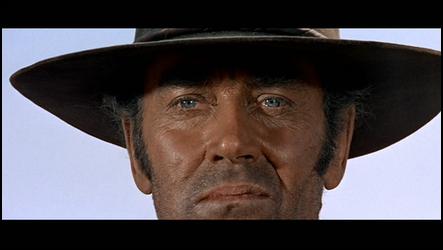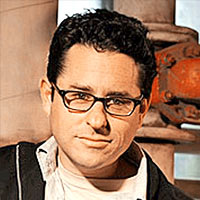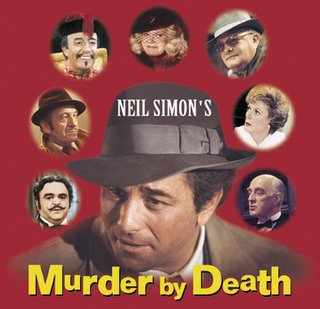
review: once upon a time in the west
1968- dir. Sergio Leone
starring- Henry Fonda, Charles Bronson, Jason Robards, & Claudia Cardinale
Circa summer 1991, my dad reluctantly John-Henried a contract that would allow cable television to be installed in our home. His decision was, perhaps, inspired by the fact that our family was embarrassingly behind the times-- we had just upgraded from a floor unit T.V. that took thirty-or-more minutes to "warm up"-- but I am inclined to believe that the company was offering a fantastic deal, 'cause we didn't simply "get cable"; we got "the whole package."
This included, what was known at the time as, "First Choice" (now, The Movie Network, or "TMN"... Basically it was "Rogers' on Demand" without the Rogers or the Demand). Regardless, we suddenly had movies pumped into the house, and video tapes ready to capture them. Instead of forming an addiction to the 40-channels of "boob-tube," as dad had feared, my sister and I found ourselves in need of a "Young Guns II" "hit" every day, and we watched that VHS recording over and over and over again. By the end of the summer we could recite the dialogue verbatim.
The source of our fascination remains enigmatic to me. I recently conducted an un-scientific poll, and the results seem to suggest that a majority of viewers aged 18-30 have never seen a western, let alone devoted an entire summer to one. Of course, Young Guns II has a contemporary flair that undermines many of the stigmas we might attach to more traditional westerns.
I, myself, grew up believing that the western genre was archaic in league with our floor unit. My resistance to these films was based on the superficial grounds that they looked old and boring. It was only two years ago that I finally shed the last of my preconceptions and pitched a wagon towards the western frontier.
For fear of carpal tunnel syndrome, I will resist the urge to recount the entire journey. It is, however, important to point out that I discovered a wealth of entertainment; my expectations were blown to pieces when, over the course of watching forty-some-odd films, I marked a range of plot-lines-- more diverse than I ever would have fathomed. These were not the "cowboy and 'injun'" pictures that had fettered my imagination for nearly two decades... No, these are films that depict a variety of universal human conflicts against a backdrop of stunning vistas, riveting action, and intricate gun-play.
In order to convince you, dear reader, that this is so, I can either describe every western I have seen, or review the one film that contains almost every element that deems this genre worthy of your attention. Once Upon a Time in the West was not the first western I saw, nor is it necessarily the best. This Leone opus, however, is a great picture to start with if you are a reluctant inductee. In line with his previous "spaghetti westerns," Leone envisions the Wild West as a grimy half-wilderness where bounty hunters and entrepreneurs, alike, aim to earn their capital via blood-money. The burgeoning towns depicted in his films are so remote that they are virtually lawless; consequently, the stories explore human morality from a refreshingly carnal point of view.
I am purposely avoiding plot detail-- not because this film doesn't have a cohesive story-line (it does), but because Once Upon a Time in the West follows a kind of episodic structure, each sequence playing homage to classical Hollywood westerns that inspired Sergio Leone's filmmaking career. In a certain sense, OUaTitW might be described as "Baroque," rather than "revisionist" ; but it's over-the-top in the best of ways... Even without any western fore-knowledge, you will appreciate the humour and subversion that has been injected into the plot:
Frank: How can you trust a man who wears both a belt and suspenders? The man can't even trust his own pants.
As I have previously mentioned, the point of my reviews is to provide the kind of fore-knowledge one might need to appreciate, if not enjoy a film. Once Upon a Time in the West is the picture that first affords me the opportunity to really cut to the bone with my "YOU MIGHT" categories:
You Might Not Like: a few things... First, it's a WESTERN. I really believe that this is a big obstacle for a lot of people-- I was one of those people!!! Once Upon a Time in the West will cost you, maybe, $3 to rent... I bought it for less than $15. Either way, it's worth the low, low fee.
#2: It is a slow moving film-- compared to what you are used to. There are scenes that pop, but Leone has a cinematic style that favors long close-ups on actors' faces, and wide, vista like, location shots that are equally detailed in their terrains.
and #3... I suspect that the dubbing may turn a few people off. Once Upon a Time in the West was recorded in Italian (and some of it silent...) It was dubbed in English for American audiences, and you can tell the difference. Or can you? The dubbing is fairly well done, and the story is strong enough that you might forget that there is a lot of post-sound-work.
WHAT YOU MIGHT LIKE: This film has modern touches that you might find surprising. It is funnier and more tension-packed than most contemporary movies... Even though it is a '68 production, it feels surprisingly fresh.
WHAT YOU MIGHT CONSIDER: The western genre has provided the basis for most movie story-telling. The A-B-C'S of human behaviour and morality are examined and debated in these films... They are almost Shakespearian in nature. Westerns employ understandable language, though... Don't be afraid. I will publish a list of "must-see" films soon. For now, if you enjoy Once Upon a Time in the West, you will want to check out Rio Grande, Winchester '73, and/or The Quick and the Dead, just for a taste.





